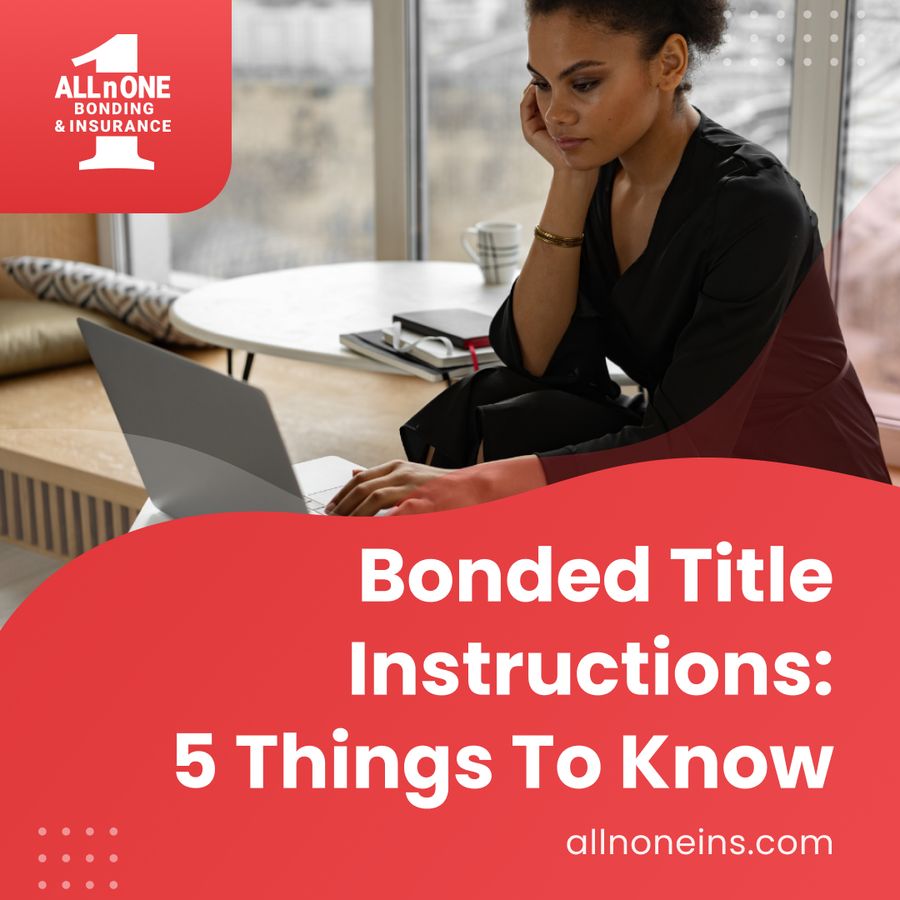Not everyone knows how bonded titles work, but the following information can help if you ever need one. To show you what to do when getting a bonded title, we’ve added 5 bonded title instructions to this post.
We’re sharing this information based on our experience in the industry because it will make getting a bonded title easier.
Keep reading to learn more about bonded titles!
Bonded title – Key takeaways
- A bonded title is a special type of vehicle title. It’s used when the ownership of a vehicle is uncertain, or the original title is lost, stolen, or damaged.
- A bonded title is a provisional ownership document backed by a surety bond. On the other hand, a regular title is a standard document from the DMV that proves clear ownership of a vehicle.
- You may need a bonded title if you have a vehicle but don’t have an existing title or proof of ownership, and contacting the previous owner isn’t doable.
- Each state has its own unique process when you get a bonded title. Naturally, the steps for Nevada and Tennessee differ.
- The cost of a bonded title varies based on the bond amount in Nevada and Tennessee.
- Title bonds for salvage vehicles cost 25% of the vehicle’s MSRP in Nevada.
- A bonded title lasts three years in Nevada and Tennessee.
- You can dispute a claim made against your bonded title.
- A bonded title can eventually be converted into a regular title.
→ 12 Frequently asked questions related to bonded titles – Read the FAQs
If desired, you can also jump to the bonded title instructions below. Otherwise, continue reading the topic introduction to learn what a bonded title is and why you might need one. section and advise!
What is a bonded title?
At its most basic, a bonded title is a legal document that shows who owns a vehicle. Moreover, it’s a provisional vehicle title backed by a surety company.
A bonded title is also known as a Certificate of Title Surety Bond or Lost Title Bond.
Bonded title vs. regular title
The big difference between a bonded title and a regular title is that a regular title establishes clear ownership of a vehicle and does not require a surety bond.
Other key differences are:
- A regular title is issued through standard DMV processes, while a bonded title requires additional steps, including obtaining a surety bond.
- Vehicles with regular titles can be easily transferred, while those with bonded titles may face challenges due to the uncertainty surrounding their ownership.
Bonded title instructions: 5 things to know
1. Each state has its own unique process when you get a bonded title
Throughout the United States, each state has its own bonded title process. This post focuses on Nevada and Tennessee, where All n One Bonding and Insurance offers its services.
Nevada Bonded Title Process
To get a bonded title in Nevada, follow these steps:
Verify Eligibility: Be a Nevada resident and ensure the vehicle is located in Nevada. Then, contact the DMV to confirm your eligibility for a bonded title.
Contact the Title Research Section: Reach out to the Title Research Section in Carson City by calling (775) 684-4810. You’ll want to request an application for a bonded title.
Complete the Affidavit: Fill out sections 1 and 2 of form VP 271, which is the Affidavit for Bonded Vehicle Title.
Vehicle Inspection: Have the vehicle inspected by a DMV Full Service office, a sworn law enforcement officer, or a DMV-authorized business.
Submit the Affidavit and Documents: Send the completed Affidavit (VP 271) and any ownership documents you have to the Title Research Section at the Nevada DMV.
Wait for DMV Processing: The DMV will conduct a brand history and vehicle theft search, calculate the bond amount, and send you the amount along with other requirements.
Obtain a Title Bond: Get a Title Bond Certificate from a surety bond company in Nevada. The bond will be for the required amount, which is 1.5 times the value of the vehicle.
Complete Vehicle Bond Affidavit: Fill out form VP 272 and have Part 4 of VP 271 notarized or witnessed by an authorized DMV employee.
Return Documents: Send all documents, affidavits, and the paid title bond to the Title Research Section using traceable mail or a tracking service.
Receive Your Bonded Title: Once your application has been approved, the Nevada DMV will issue your bonded title. They might mail it to you directly or to any lienholder associated with the vehicle. It depends on the situation. For salvage vehicles, there are additional requirements that must be met before the vehicle can be registered or sold.
Mail to:
Nevada Department of Motor Vehicles
Title Research Section
555 Wright Way
Carson City, NV 89711
Disclaimer: Before mailing any documents, please contact the Nevada Department of Motor Vehicles (DMV) to confirm the current address and any recent updates to the bonded title application process. The DMV’s policies, addresses, and requirements may be subject to change.
» MORE: For further information about title bonds and how to get a bonded title, see our Title Bond page.
Tennessee Bonded Title Process
To get a bonded title in Tennessee, take the following steps:
Eligibility Check: Ensure the vehicle is eligible for a bonded title by confirming that it is:
- Less than 30 years old.
- Has a fair market value of $3,001 or more.
- Does not have any liens against it.
Reach Out to the Previous Owner: If you know who the previous owner is, send them a certified letter asking for the original title. If you don’t know who they are, you’ll need to let the public know that you plan to title the vehicle. You can do this by putting a notice in a general circulating publication in your county. Give it 10 days to see if anyone comes forward.
Figure Out the Bond Amount: The bond amount should be 1.5 times the appraised value of the vehicle. To get an idea of the fair market value, we suggest asking a dealer for an estimate.
Get the Surety Bond: To streamline your application for a surety bond, consider contacting All n One Bonding and Insurance. Our team can guide you through the process and make sure you have all the required documentation.
Turn in the Paperwork: Gather your application, surety bond, bill of sale, and any necessary fees and taxes. Take all of this to the county clerk for approval.
Wrap it Up: Once you’ve finished all the steps and the county clerk gives the okay on your paperwork, you’ll be able to register the vehicle in your name.
2. The cost of a bonded title varies based on the bond amount
Nevada:
The cost of a bonded title in Nevada is based on the bond amount, which again, is 1.5 times the vehicle’s MSRP. So, if the MSRP is $10,000, the bond would be $15,000.
Now, to get that bond with All n One Bonding and Insurance, you would pay 1% to 5% of the total bond amount. We would also charge a $25 new policy fee, which we do for every bond. And if a credit card is used, there is a credit card or bank fee of 0.035 added to the total charge.
Let’s look at a purchase example:
Let’s say you have a vehicle with an MSRP of $10,000 with a $15,000 required bond. If you qualify for a 2% rate, the cost of the bond would be $300 ($15,000 x 0.02). Add in the $25 new policy fee, and your total cost would be $325.
If you choose to pay with a credit card, there would be an additional fee of $11.38 ($325 x 0.035). This brings the total cost to $336.38 when paying with a credit card.
In summary, a vehicle with an MSRP of $10,000 in Nevada would look as follows:
- Bond amount: $15,000
- Bond cost (at 2% rate): $300
- New policy fee: $25
- Total cost (paying by cash or check): $325
- Credit card fee (if applicable): $11.38
- Total cost (paying by credit card): $336.38
Tennessee:
In Tennessee, as in Nevada, the total bond amount is also set at 1.5 times the vehicle’s appraised value. Likewise, the amount you pay for the bond with All n One Bonding and Insurance is 1% to 5% of the total bond amount, plus applicable fees.
3. A bonded title lasts three years in some states
How long a bond lasts differs from state to state. The specific lengths of time in Nevada and Tennessee are as follows.
Nevada: 3 years.
Tennessee: 3 years.
The bond period acts as a safety net for previous owners, lienholders, or people who might buy the vehicle later on. If any issues come up with the title, like someone else claiming they own it, the bond covers potential losses or damages.
4. You can dispute a claim made against your bonded title
To dispute a claim made against your bonded title, follow these steps:
- Read through the details of the claim against your bonded title. This will help you understand what the claim is about and how to respond to it.
- Contact the surety company that issued your title bond and let them know you want to dispute the claim. They’ll give you instructions on what to do next and ask for evidence to back up your dispute.
- Gather up any documents, receipts, contracts, etc., that support your side of the story and show why the claim against your bonded title is wrong.
- Send your documents and evidence to the surety bond company.
- Consider getting legal help if needed. In some cases, the surety company might suggest mediation or arbitration. If you can’t resolve the dispute this way, you might have to defend your position in court, so it’s worth preparing for.
5. A bonded title can eventually be converted into a regular title
In both Nevada and Tennessee, after the three-year period, you won’t need to renew the bond again. You should be able to get the “BONDED” designation removed from the title, which will allow you to convert the bonded title into a standard, “clean” title.
This process typically involves:
- Gathering required documents
- Filling out an application to the DMV (Forms vary per state)
- Paying required fees
- Final vehicle inspection
- Receiving the regular title
Bonded title – Conclusion
In this post, we covered bonded title instructions and 5 important things to know when getting a bonded title. For a full overview of the content, see the Key Takeaways.
To get a title bond for your vehicle, contact All n One Bonding and Insurance. We’ve served clients in Nevada and Tennessee for many years, earning multiple 5-star ratings on Google. If you need fast and friendly service, we can help.
Disclaimer: Nevada and Tennessee may have more current or accurate information. We make no warranties or guarantees about the accuracy, completeness, or adequacy of the information contained in this post. Please refer to official sources. The information in this post is not a substitute for professional legal advice.



